Articles
China - Taiwan
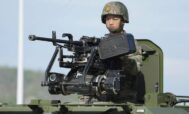
China - Taiwan
May — December 2024Increasing Perils Ahead
Lai Ching-te insisted at his May inauguration that Taiwan is sovereign and not subordinate to China.
Beijing reacted by increasing cross-Strait tensions. China’s latest rounds of military exercises make clear that it is preparing to use force or at least gray-zone intimidation to effect reunification. Taiwan’s opposition Kuomintang continued unofficial contacts with the Chinese Communist Party, seeking reconciliation but risking aiding China’s efforts to fragment Taiwan. Taiwan’s TSMC continues to expand in Taiwan and overseas in ways that keep it at the center of the global high-tech economy. Taiwan has increased its purchases of military equipment from the US and opened negotiations on a bilateral tax agreement. Beijing views US support for Taiwan as collaboration in Lai’s separatism. US President-elect Donald Trump has said that Taiwan stole the production of semiconductors from the US and should pay for US military support. However, this animus may be balanced by the outspoken Taiwan supporters he has chosen for his national security team. Can Taiwan overcome its internal divisions and Trump’s Taiwan skepticism? Can China, Taiwan, and the US step back from a confrontational spiral? None of this will be easy, but failure may put Taiwan’s future at risk.
Lai Ching-te’s Inaugural Address and Cross-Strait Relations
The most important development in relations between Taiwan and China over the past six months has been the inauguration of Taiwan’s new president, Lai Ching-te, and China’s reaction. Lai was elected on Jan. 13 to succeed Tsai Ing-wen and continue the Democratic Progressive Party’s (DPP) leadership of Taiwan’s government. In his inaugural address on May 20, Lai echoed themes familiar from Tsai’s presidency. Lai began by proclaiming that the people of Taiwan had elected him as “president of the Republic of China in accordance with the Republic of China Constitution system” and that “the Republic of China Taiwan is a sovereign, independent nation in which sovereignty lies in the hands of the people.” He praised the people of Taiwan “for refusing to be swayed by external forces.” He promised to “continue working with other democratic nations to form a democratic community.”
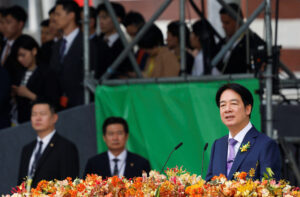
Figure 1 In his inauguration speech, Taiwan’s new President Lai emphasized China must stop military intimidation. Photo: PBS News.
Recalling “Russia’s invasion of Ukraine and conflict between Israel and Hamas,” Lai warned that “China’s military actions and gray-zone coercion are considered the greatest strategic challenges to global peace and stability.” And “no one wants [Taiwan’s] achievements to be destroyed by war.” Lai promised that his new government would uphold Tsai’s Four Commitments, which include that “the ROC (Taiwan) and the [the People’s Republic of China] PRC should not be subordinate to each other.” Continuing to echo Tsai’s words, Lai said that Taiwan would “neither yield nor provoke, and maintain the status quo.” What Lai did not say May 20 was that his administration would continue conducting cross-Strait relations on the basis of the ROC Constitution and Cross-Strait statute.
Lai then issued a challenge to Beijing: “I hope that China will face the reality of the Republic of China’s existence, respect the choices of the people of Taiwan, and in good faith, choose dialogue over confrontation, exchange over containment, and under the principles of parity and dignity, engage in cooperation with the legal government chosen by Taiwan’s people.”
Using language apparently designed to appeal to Washington, Lai concluded that “Taiwan is strategically positioned in the first island chain, and what affects us here affects global geopolitical development,” and Taiwan remains “a frontline guardian of world peace.”
To Beijing, Lai Looks Just Like Tsai
Beijing undoubtedly read Lai’s words as a continuation of the policies in Tsai’s first inaugural address in 2016. Lai’s call for dialogue almost certainly reminded Beijing of Tsai’s offer to open a dialogue based on her reading of cross-Strait talks starting in 1992.
Tsai had promised “to maintain the existing mechanisms for dialogue and communication across the Taiwan Strait,” including the “various joint acknowledgments and understandings” reached by the two sides in 1992 as well as the “over twenty years of interactions and negotiations” since 1992. She called on China to “set aside the baggage of history and engage in positive dialogue, for the benefit of the people on both sides.”
Because Tsai did not identify the outcome of the 1992 talks as “the 1992 Consensus,” a term coined by a KMT commentator almost a decade afterward and then adopted by Beijing, China’s Taiwan Affairs Office (TAO) rejected Tsai’s offer out of hand. It insisted that Taiwan acknowledge itself part of “one China,” which Tsai refused to do. Beijing sees Lai’s offer of dialogue as more of the same.
Lai’s Inaugural Speech and Reactions Were Predictable
In the wake of Lai’s inaugural speech, the TAO responded in the same vein as they had to Tsai eight years earlier: “The Democratic Progressive Party stubbornly adheres to the separatist position of ‘Taiwan independence,’ refuses to recognize the ‘1992 Consensus’ that embodies the one-China principle . . . spreads separatist fallacies, incites confrontation between the two sides of the Taiwan Strait, and attempts to ‘rely on foreign countries to seek independence’ and ‘seek independence by force’.” Chinese Foreign Minister Wang Yi was even more outspoken: “The treacherous acts of Lai Ching-te and his ilk, who betray the nation and their ancestors, are despicable” (translation from 5-21-2024 Sinocism.)
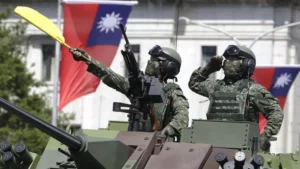
Figure 2 Taiwanese soldiers salute during National Day celebrations in front of the Presidential Building in Taipei, Taiwan, October 10, 2021. Photo: AP, Chiang Ying-ying.
Lai’s critics in Taiwan worried that his speech might have weakened any chance for cross-Strait dialogue. Lai’s speech was “tougher than expected” and might be “moving towards a sovereign nation without formally declaring independence under the name of Taiwan,” according to James Yifan Chen at Tamkang University.
The US State Department congratulated Lai and Taiwan: “The United States congratulates Dr. Lai Ching-te on his inauguration as Taiwan’s fifth democratically elected president. We also congratulate the Taiwan people for once again demonstrating the strength of their robust and resilient democratic system.” The Wall Street Journal captured the US reaction in its headline: “Taiwan’s New President Serves Up Predictability in Era of Turmoil.”
Perhaps the single most striking feature of Lai’s inaugural address and the reactions to it was the sense that there is no longer any hope for dialogue. Taiwan’s offer to open a dialogue were offered not for Beijing but to appear responsible in the eyes of Taiwanese independents and foreign audiences, most importantly the US. Lai and the TAO both seemed well aware that Beijing’s prerequisites for dialogue—acknowledging the 1992 Consensus by name and describing Taiwan as part of “one China”—were simply not feasible politically for a DPP president of Taiwan in 2024.
Lai’s National Day Speech Offered Half an Olive branch
On Oct. 10, Lai gave his second major speech of the year on the National Day of the Republic of China. Lai said that the ROC began in 1911, when a group of democratic dreamers in China overthrew the Qing Dynasty; it was defended in 1949, when ROC soldiers defended the island of Kinmen; and it claimed its democracy in 1979 when Taiwan dissidents demonstrated in Kaohsiung to celebrate International Human Rights Day. For Lai, the message was clear: Taiwan’s democracy is the fulfillment of the aspirations of the founders of the ROC in 1911, a dream that began before the Chinese Communist Party was founded. In doing so, Lai linked Taiwan with China in a way no DPP leader before him had done. When President Tsai celebrated the National Day of the Republic of China in 2023, she praised “the unwavering spirit that has underpinned the Republic of China since establishing itself in Taiwan 74 years ago,” words which seemed to suggest that for her the ROC was only the ROC after it came to Taiwan and was distinct from the ROC in China.
Although the dream began in China, Lai made it clear that today it was not the dream of China’s current rulers but instead “the dream that Taiwan’s 23 million people all share.” To drive home that point, Lai said again that “the Republic of China and the People’s Republic of China are not subordinate to each other. On this land, democracy and freedom are growing and thriving. The People’s Republic of China has no right to represent Taiwan.” In short, Beijing’s one-China principle does not apply in Taiwan.
The rhetorical and military responses from China were predictable and unmistakable. According to the TAO, Lai “continued to advocate the ‘new two-state theory’ of “mutual non-subordination” in his speech [and] fabricated the fallacy of “Taiwan independence.” The US rebuke to the TAO was equally predictable: “The PRC response with military provocations to a routine annual speech is unwarranted and risks escalation.” The spokesperson for China’s Ministry of Foreign Affairs (MOFA) responded in kind: The US should “stop arming Taiwan and stop sending any wrong signal to the ‘Taiwan independence’ separatist forces.”
Two Double-edged Sword Exercises
Both Lai’s inaugural speech and his Oct. 10 National Day speech were followed by large-scale military exercises launched by China’s People’s Liberation Army (PLA), dubbed Joint Sword 2024a and 2024b. China’s designating these exercises Joint Sword 2024a and 2024b linked them to the Joint Sword 2023 exercise that the PLA conducted in the wake of President Tsai’s meeting with US Speaker of the House Kevin McCarthy in April 2023 and less directly to the extended PLA exercise in the aftermath of Speaker Nancy Pelosi’s visit to Taiwan in August 2022.
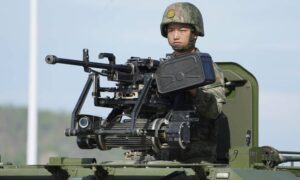
Figure 3 The Chinese People’s Liberation Army (PLA) launched ‘Joint Sword-2024B’ military drills near Taiwan on Monday, the country’s Defense Ministry said in a statement. Photo: MEHR News Agency
The exercises had two purposes. The first was propaganda. China’s foreign ministry described Joint Sword 2024a, launched three days after Lai’s inauguration as “a necessary and legitimate move to safeguard national sovereignty and territorial integrity, crack down on ‘Taiwan independence’ separatist forces and their separatist moves, and send a warning to external interference and provocation.” The second purpose of Joint Sword 2024a was to strengthen PLA capabilities to interdict commercial traffic in the Taiwan Strait and between Taiwan and the islands it controls near the Chinese coast. For the first time, the exercise incorporated Chinese Coast Guard vessels, which practiced inspections of foreign vessels.
Joint Sword 2024b was the briefest in the Joint Sword series to date, occurring over a 13-hour period on Oct. 14, but it was nonetheless intense. The exercise included 125 PLA aircraft flying close to Taiwan, a new single-day high, as well as 14 PLA navy vessels and an additional 12 Chinese government vessels operating near the island. Perhaps the most striking aspect of the exercise was that Chinese Coast Guard vessels completely surrounded Taiwan in an apparent effort to practice the deployment that would be required to blockade the island. The progressive expansion of the Chinese Coast Guard role also may signal that China is treating the Taiwan Strait and the area around Taiwan as internal waters and therefore within the purview of its law-enforcement activities. More ominously, the PLA and the Chinese Coast Guard appear to be systematically intensifying military activity in ways that will make them better able to shift quickly from gray-zone intimidation to directly coercive military actions against Taiwan and against foreign merchant and military approaching near Taiwan.
Fishing is Risky Near Offshore Islands
The increasing presence of the PLA Navy and the Chinese Coast Guard in waters around Taiwan’s Kinmen (also known at Jinmen or Quemoy) and Matsu islands near the Chinese coast and the Penghu islands in the middle of the Taiwan Strait have made these waters and the Taiwanese who fish there an ever more prominent flashpoint. On May 29, Taiwan’s Coast Guard warned two PLA vessels to retreat from restricted waters they had entered near Kinmen. A month later, four Chinese Coast guard vessels sailed to within five miles of Kinmen despite Taiwanese Coast Guard attempts to warn them off. On July 2, the Chinese Coast Guard seized a Taiwanese fishing vessel in what it said were Chinese waters near Kinmen. In a rare US comment on such incidents, the White House spokesperson told reporters it was monitoring the situation. The Taiwanese ship, which had sailed from the Penghu islands, and its crew were seized and held for over a month; the captain was detained until mid-November. In one sense, these sorts of fisheries incidents have been business as usual for some time, but the increasing prominence of the PLA Navy and Chinese Coast Guard as agents of gray-zone coercion means that each incident risks becoming a cross-Strait crisis. Even the release of detained fishermen, once a matter of several hours, is now delayed by days or months. China is increasingly choosing to negotiate such releases with KMT local officials as part of United Front efforts to treat Taiwan’s KMT opposition as the only intermediary they will deal with.
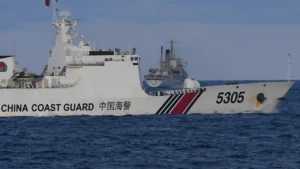
Figure 4 Chinese coast guard ships entered prohibited or restricted waters around Taiwan’s frontline islands of Kinmen on Monday, a Taiwan minister told reporters on Tuesday amid a rise in tension with Beijing. Photo: Ted Aljibe | Afp | Getty Images
Opposition KMT Challenges Lai and the DPP—Wise Counsel or Risk?
The Jan. 13 elections gave the opposition KMT effective control of the Legislative Yuan (LY), the national legislature. The KMT immediately used its control of the LY to challenge the DPP government. KMT attempted to legislate laws making the executive branch under President Lai more accountable to the LY. These efforts were opposed by the Lai administration as a power grab, and his administration appealed the proposed rules to Taiwan’s Constitutional Court, which for the most part found the rules unconstitutional. The KMT has also initiated a series of challenges to the government budget submitted by Lai’s Premier Cho Jung-tai. The two sides reached a compromise on Nov. 8, enabling the LY review of the budget to proceed. However, this skirmish portends a deadlock that could threaten Taiwan’s ability to increase defense spending as both the DPP and KMT say they are committed to do.
The opposition KMT also criticized Lai’s approach to China as it had criticized Tsai’s. In response to Lai’s inaugural address, former President Ma Ying-jeou challenged Lai’s cross-Strait approach: “He should have dialogue with the government across the Strait by returning to historical and cultural common ground with the Chinese. Only in this manner can there be a chance for peace in the Taiwan Strait.” In November, Ma invited China to send a delegation of students to visit Taiwan, reciprocating the visit of Ma and Taiwan students this April during which Chinese President Xi Jinping had a high-profile meeting with Ma. After a flurry of concerns that the Chinese Communist Party had handpicked the students, which they obviously had, Taiwan’s Mainland Affairs Council (MAC) approved the visit. The MAC then invited China to allow Chinese students to study in Taiwan on a regular basis, but China has thus far not responded. Former KMT leader of the LY Wang Jinping also visited China, and a delegation from Shanghai is scheduled to visit Taipei in December in another signal that China welcomes contacts with KMT politicians such as Taipei Mayor Chiang Wan-an.
Although China welcomed KMT visitors, it issued a stark warning that others might not be welcome. A month after Lai’s inauguration, China issued regulations to enforce the Anti-Secession Law it promulgated in 2005. These guidelines “detailed the steps it might take to punish supporters of Taiwanese self-rule. The new rules adopted by China authorize execution for what it describes as exceptionally severe cases of Taiwanese separatism, though they do not say exactly what actions might constitute a severe offense.” After a member of a tour group from Taiwan was detained in China in early June without explanation, Taiwan’s MAC issued a warning to anyone considering travel to China. On Aug. 3, a Chinese court sentenced a Taiwanese, Yang Chih-yuan, to nine years in prison for what it identified as pro-independence activities, specifically because Yang had helped organize the Taiwan National Party. Yang had been in China to teach Go. On Sept. 1 China detained an executive from Formosa Plastics without explanation.
Can Taiwan Acquire the Military Equipment It Needs?
As the wars in Ukraine and the Middle East have continued to challenge the ability of the US to supply needed weapons systems to its allies and partners, the US State Department acknowledged that “insufficient production capacity” had slowed weapons deliveries to Taiwan. That backlog was reported to have reached $20.5 billion by August. Speaking virtually to an AI forum in Washington two months earlier, Taiwan’s Vice President-elect Bikhim Hsiao bemoaned “deficiencies in the traditional US defense industry production base, ” saying that they meant that “the current US defense industry base is producing neither enough nor on time the hardware to meet global demand.” She called for the US manufacturers to enter into coproduction arrangements with Taiwan companies.
The US Department of Defense (DOD) Inspector General found that not only the speed but also the quality of deliveries was deficient, stating “the DOD’s delivery of non–mission-capable items [as part of Presidential Drawdown authority] to Taiwan inhibits the DoD’s ability to achieve its security cooperation goals and risks degrading Taiwan’s confidence in the United States.” At least one US defense industry analyst said that the delivery deficit had been cut to approximately $9 billion since then, due less to any corrective actions and more due to the normal process of transferring equipment and munitions ordered earlier.
Despite these acknowledged difficulties, on Sept. 27 the US committed to provide Taiwan up to $567 million in defense articles and services under Presidential Drawdown Authority in 2024, its largest assistance package ever for Taiwan, following its commitment of $345 million in 2023. On June 18, the US Defense Security Cooperation Agency (DSCA) offered to sell Taiwan anti-personnel Switchblade drones and anti-armor Altius drones, together worth $360 million. These contracts were then signed by Taiwan on Oct. 15 and would expand Taiwan’s acquisition of asymmetric defense capabilities.
Biden Administration Lends Support to Lai Government
Relations between Lai’s new government from the Biden administration have started on a positive note. In August, Taiwan Foreign Minister Lin Jia-lung and National Security Advisor Joseph Wu held security talks with senior Biden officials outside Washington, according to the Financial Times. The most recent gathering under this “Special Channel” convened in February 2023. In early December, the Biden administration afforded Lai courteous treatment during his transits through Hawaii and Guam en route to Taiwan’s South Pacific allies. Biden officials have viewed Lai as basically maintaining Tsai Ing-wen’s pragmatic and responsible approach toward cross-Strait relations.
On the other hand, Washington has uniformly viewed Beijing’s behavior toward Lai as belligerent, prompting demonstrations of support. Notably, US Navy vessels continue to sail through the Taiwan Strait individually and with partner nations. The week following the PLA’s brief yet expansive Joint Sword 2024B exercises in mid-October, a US Navy destroyer and a Canadian frigate transited the Taiwan Strait on Oct. 20. The PLA reacted with live-fire drills nearby Pingtan island off Fujian province two days later.
Trump’s Support Less Certain
Donald Trump’s election has added further uncertainties. On June 25, Trump told Bloomberg Businessweek that “I think Taiwan should pay us for defense. You know, we’re no different than an insurance company.” As Trump has assembled his national security team, his choices overwhelmingly reflect a far stronger commitment to defending Taiwan and a far greater emphasis on reinforcing Taiwan’s military capabilities as part of the first island chain. Secretary of State Designate Marco Rubio and National Security Advisor Designate Michael Waltz are both generally identified as China hawks and advocates for increased US military sales to Taiwan. On the sidelines of the Republican Convention, Rubio told Fox News, “I don’t have any worries about the US being supportive of Taiwan and doing everything we can to discourage the Chinese from invading.” In addition to the impact of his own nominations, Trump will walk into a US defense establishment already intently focused on defending Taiwan. Adm. Samuel Paparo, head of the US Indo-Pacific Command, told The Washington Post that “I want to turn the Taiwan Strait into an unmanned hellscape using a number of classified capabilities, so that I can make their lives utterly miserable for a month, which buys me the time for the rest of everything.”
Trump’s former National Security Advisor, Robert O’Brien, put a positive spin on Trump’s remarks to Bloomberg, saying that Trump was simply calling for burden sharing, adding that Taiwan should increase its defense spending to 5% of gross domestic product. The Taiwan government counters that it is already at 2.5% of GDP and that President Lai proposed an increase of 6% on that. Nonetheless, David Sacks of The Council on Foreign Relations captured the attitude of American analysts: “The consensus is that Taiwan is still not taking the existential threat that it faces seriously enough and should raise defense spending far more rapidly.”
Can Taiwan Build the Military Capability It Needs?
Over the past six months, Taiwan has taken a number of steps that suggest it is beginning to reform its approach to its defense. President Lai chose a civilian Minister of National Defense, Wellington Koo, who had served Tsai as National Security Advisor since 2016. Earlier efforts to reform the military by imposing a civilian minister of National Defense by President Lee Teng-hui (KMT) in the early 1990s and by President Chen Shui-bian (DPP) in 2008 both faltered, but there is hope that Koo’s extended service under Tsai may enable him to break the resistance of the uniformed military to civilian oversight and modernize the force. Koo’s announcement that the ROC military would end goose-step marching and bayonet training was considered a symbolic watershed.
In domestic procurement, Taiwan commissioned two naval corvettes equipped with Hsiung-feng anti-ship missiles, designed to counter the PLA’s growing fleet of aircraft carriers. These two will join four already in service, and Taiwan’s MND has said it expects to add five more of these corvettes by the end of 2026.
Beyond Defense Spending and Acquisitions
On Sept. 26, President Lai convened the first meeting of a special committee to strengthen civil defense and resilience on the island. Its task is to integrate civilian forces into responses to potential attacks from Beijing, manage emergencies, and maintain social order and stability. The plan would train 400,000 civilians to respond to a civil or military emergency. Taiwan civil society began a series of initiatives that would complement the government’s efforts. On Facebook, one group, the Kuma Academy, explained that it was “awakening the spirit of resistance in Taiwanese society.” China’s Taiwan Affairs Office (TAO) responded by sanctioning Taiwanese businessman Robert Tsao Hsing-cheng, who founded United Microelectronics Corporation (UMC), and Taiwanese lawmaker Puma Shen for funding and organizing the group.
The darker side of Taiwan’s response to China’s increasing campaign of gray-zone intimidation may be glimpsed in the trailer for a TV miniseries, Zero Day, planned for 2025. It will offer a dystopian view of how China might concoct an excuse to blockade and then invade Taiwan, all the while barraging Taiwan with defeatist disinformation through broadcast and social media.
Strong US-Taiwan Economic Ties Make Further Progress
Following an intensive in-person negotiating round in Taipei in early May, US and Taiwan trade negotiators continued discussions on the labor, environment, and agriculture provisions of The 21st Century Trade Initiative. A follow-on negotiating round did not convene as anticipated, indicating gaps remain. In November, US Trade Representative (USTR) Katherine Tai met her new Taiwan counterpart, Minister without Portfolio Jen-ni Yang, in Peru at the Asia Pacific Economic Cooperation Forum (APEC) trade ministerial. The USTR readout notes the “important progress” achieved under the trade initiative to date but gives no indication of future talks. Separately, the trade initiative’s first agreement, signed in June 2023, is poised to go into effect by the end of 2024 following certification by USTR and a final nod from the US Congress.
The US Treasury Department in late October announced the launch of negotiations with Taiwan on a comprehensive double taxation agreement. Long sought by Taipei, a double tax agreement had struggled to gain traction inside the US government. Views have shifted with the expanding footprint of TSMC and its suppliers in the United States since 2021. In addition, Congress this year inched closer to legislating adjustments to the US tax code that would benefit Taiwan investors in the United States. Such Congressional action could not address the double taxation concerns of US investors in Taiwan without action by Taiwan’s government, presumably after reaching agreement with the US. The Treasury Department’s announcement specifically touts the prospective agreement’s tax benefits for small and medium-sized Taiwan firms within the US semiconductor supply chain. A first round of negotiations is expected before the end of the year, and the final agreement will require the blessing of Congress.
The booming US-Taiwan commercial relationship, supported by a handful of active governmental dialogues, could face headwinds if President Trump follows through on a campaign promise to impose a 10-20% tariff on all US imports. Taiwan’s export-driven economy has grown increasingly reliant on the United States in the last half dozen years, with exports to the US poised to exceed $100 billion in 2024. At the same time, Trump has pledged even higher tariffs on China, which could cause Taiwan firms supplying the US market from China to shift manufacturing back to the island. The Lai government has expressed interest in a second trade agreement with the United States, but trade negotiations with the second Trump administration could invite scrutiny of the growing US-Taiwan trade imbalance and pressure on Taiwan to purchase more US goods.
TSMC Deepens Its Alignment with the United States
Taiwan Semiconductor Manufacturing Company brought online its first fab (semiconductor production plant) in Arizona during the fall, after having overcome a myriad of labor disputes and construction delays since 2021. Initial output batches have shown chips with slightly higher yields, meaning fewer defects per wafer, than the leading TSMC fabs in Taiwan. In a vote of confidence for TSMC’s Arizona site, the US Commerce Department on Nov. 15 finalized a $6.6 billion cash subsidy it had provisionally offered to the Taiwanese chipmaker earlier in the year.
TSMC’s reputation took a hit, however, when Canadian news platform TechInsights discovered a TSMC-manufactured chip inside Huawei’s latest AI processor in October. TSMC launched an internal investigation and identified Sophgo Technologies, a Chinese customer, as the culprit. TSMC promptly stopped shipments to Sophgo and notified the US Commerce Department, which has imposed extensive export controls on Huawei since 2019. On Nov. 10, TSMC reportedly received a letter from the Commerce Department’s Bureau of Industry and Security requiring it to suspend advanced semiconductor sales to all Chinese customers manufacturing AI processors. This so-called “is informed” letter has underscored the US government’s expectation that TSMC and other chip suppliers will conduct thorough “know your customer” checks and remain vigilant. TSMC appears unlikely to face penalties over this incident.
The incoming Trump administration will likely prioritize the continued onshoring of chip manufacturing. Trump, without evidence, accused Taiwan of “stealing the US chip industry” while on the 2024 campaign trail. He also described CHIPS funding incentives as “so bad” and instead called for tariffs on imported semiconductors to spur domestic manufacturing. Taiwan’s commanding lead in advanced semiconductors and TSMC’s now finalized contract with the US Commerce Department on its $6.6 billion subsidy provide some safeguards. A more acute risk could be pressure on TSMC to begin in Arizona production of its most cutting-edge chips, at the 2-nanometer level, ahead of the scheduled 2030 target date.
Perils Ahead
As we conclude this series of periodic updates on Taiwan and its relationship with China, cross-Strait conditions are more perilous than they have been since 1950 when the US inserted the Seventh Fleet into the Strait at the beginning of the Korean War.
Under President Lai, and almost any successor imaginable, Taiwan will continue to develop its political identity as a responsible and de-facto independent member of the global order. China will continue to insist it has the unilateral right to control Taiwan. It will expand its efforts to move Taiwan toward what it calls peaceful reunification without any prospect of success. Anticipating failure, China will continue expanding its military capability to compel reunification. Taiwan’s survival will rely on its ability to build and arm a military sufficient to deter and, if necessary, resist PLA military action. Taiwan’s efforts to ensure a peaceful status quo will depend well on its growing economic and high-technology importance as well as the support and US partner and allies. The US will find that its high technology economy is increasingly dependent on Taiwan and that supporting Taiwan is a useful component of its economic and strategic pressure against China.
This triangular clash portends a growing risk that cross-Strait political confrontation might become a military confrontation, devastating China, Taiwan, and their neighbors in East Asia and undermining US regional leadership. Is Taiwan willing to spend enough and strengthen its social cohesion and resilience to deter a Chinese assault or blockade or, if necessary, to delay one long enough for the US to choose to intervene? The challenge for Taiwan and China will remain what it has been since 2000, at least. Can they argue over their incompatible visions for Taiwan’s future without undermining their stability and prosperity? Will the US under a second Trump administration continue the US policy of “strategic ambiguity” or “dual deterrence” without dragging Taiwan into its own intensifying confrontation with China? Will China and the US find that their broader geostrategic and economic interests sufficiently outweigh their dissatisfaction with the cross-Strait status quo and trends to enable them to kick the can down the road? Finally, can wisdom and compromise overcome intransigence on all three sides?
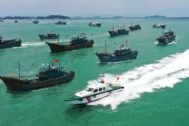
China - Taiwan
January — April 2024Taiwan and China—Steady As She Goes
As 2024 dawned, Chinese President Xi Jinping reiterated in his New Year Address that Taiwan must unify with China. In her New Year Address, Taiwan President Tsai Ing-wen, with the election of her successor only 14 days away, repeated her offer to meet China on the basis of equality, mutual respect, and without preconditions, echoing themes dating back to her first inaugural address in 2016. On Jan. 14, Tsai’s chosen successor, Vice President Lai Ching-te, won an unprecedented third successive term for the Democratic Progressive Party, promising to uphold the independence of the Republic of China, but the party lost its majority in the legislature. A month later, two Chinese fishermen operating illegally near Kinmen Island died when their boat capsized as they were pursued by the Taiwan Coast Guard. Five days later, a Chinese Coast Guard vessel boarded and inspected a Taiwanese tour boat near Kinmen. Tensions grew but they did not boil over.
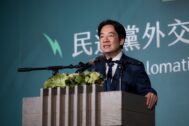
China - Taiwan
September — December 2023Taiwan Voters Choose Independence
Taiwan’s election campaign has concluded. Voters went to the polls on Jan. 13. As has been the case in almost every election, cross-Strait relations with China were the central issue, a secondary issue being President Tsai Ing-wen’s management of the economy. The outcome of the election will largely dictate the course of Taiwan-China relations over at least the next four years. The Democratic Progressive Party (DPP) candidate and President Tsai Ing-wen’s chosen successor, William Lai Ching-te, the eventual winner, proclaims that Taiwan is already independent as the Republic of China. It should continue to diversify economic linkages away from China, strengthen military deterrence, and hope that China will eventually offer talks without one-China preconditions. The opposition Kuomintang candidate, Hou Yu-ih, called for expanded cross-Strait economic ties and dialogue with China under the one-China banner to reduce tensions while Taiwan also builds its military deterrence. China has deployed economic sticks, gray-zone military intimidation, and fake news to influence the election.
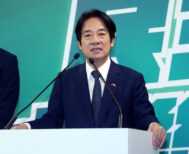
China - Taiwan
May — August 2023Stark Choices Confront Taiwan Voters
Taiwan’s presidential election campaign has begun. Lai Ching-te, Taiwan’s vice president and Democratic Progressive Party (DPP) candidate, Hou Yu-ih from the Nationalist (Kuomintang, or KMT) Party, Ko Wen-je of Taiwan People’s Party (TPP), and independent Terry Gou offer Taiwan voters four different visions of Taiwan’s future relationship with China. As senior US and Chinese officials resumed long-stalled face-to-face meetings, China warned once again that it has no room for compromise or concession on Taiwan. Yet, when Lai completed almost invisible transits through the US en route to Paraguay and back, China’s military response seemed almost pro-forma. When US, Japanese, and South Korean leaders reiterated at the trilateral Camp David summit their staunch opposition to China’s intimidation, China chose to interpret their words as one more promise to support Taiwan. The US accelerated weapons deliveries to Taiwan and expanded training for Taiwan’s military, and Taiwan announced that its defense budget will increase by 7.5% in 2024. Taiwan’s TSMC moved forward on constructing its Arizona factory despite some hiccups, and the US and Taiwan signed a long-awaited trade deal—the first part of their 21st Century Trade Initiative.
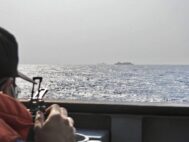
China - Taiwan
January — April 2023Confrontation Muted, Tensions Growing
As 2023 began, cross-Strait confrontation was muted. Travel began returning to pre-COVID levels across the Strait and between the mainland and Taiwan’s offshore islands. At China’s annual National People’s Congress, outgoing Premier Li Keqiang and reanointed President Xi Jinping eschewed inflammatory rhetoric about reunification with Taiwan. Taiwan and the US kept Taiwan President Tsai Ing-wen’s transit of the US low-key. Tsai met House Speaker Kevin McCarthy in California, deflecting the speaker’s expressed interest in visiting Taiwan and avoiding the destabilizing Chinese military exercises around Taiwan that followed Speaker Pelosi’s visit last August. Despite this calm, seeds of confrontation proliferated. China cut a communications cable to Taiwan’s offshore islands and announced a coast guard drill to inspect commercial shipping in the Taiwan Strait, both interpreted as practice for gray-zone coercion. China persuaded Honduras to sever its longstanding diplomatic ties with Taiwan. Taiwan increased its military budget and expanded training with US forces. Former Taiwan President Ma Ying-jeou visited China and met Chinese officials, endorsing the 1992 Consensus and signaling that the upcoming election campaign for Taiwan’s president will again offer two very different visions of Taiwan’s future relationship with mainland China.
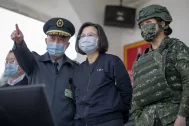
China - Taiwan
September — December 2022Tensions Intensify as Taiwan-US IT Cooperation Blossoms
In the wake of then US Speaker of the House Nancy Pelosi’s visit to Taiwan in August, China’s extensive military exercises continued to impose a more threatening “new normal” in the Taiwan Strait. Taiwan continued to be the focus of heated public exchanges between the US and China. US President Biden said, for a fourth time, that the US would defend Taiwan and added an inflammatory codicil that independence was for Taiwan to decide. At the 20th Congress of the Chinese Communist Party, General Secretary Xi Jinping promised China would strive for peaceful reunification with Taiwan but would not renounce use of force. On Dec. 23, Biden signed the Taiwan Enhanced Resilience Act and a State Department appropriation providing $2 billion in loans for Taiwan to purchase US equipment. Two days later, China sent 71 military aircraft and seven ships to intimidate Taiwan, its largest-ever one-day exercise near the island. Two days later, Taiwan President Tsai Ing-wen announced that Taiwan would extend its military conscription to 12 months. TSMC formally broke ground for the first of two factories in the US, a $40 billion investment.
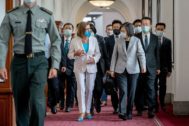
China - Taiwan
May — August 2022Pelosi’s “Ironclad Commitment” or “Political Stunt” Leads to Crisis and Promises Instability in the Taiwan Strait
Between May 1 and Sept. 1, tensions between Taiwan and China exploded in ways few anticipated but were in retrospect the culmination of well-established dynamics. The US once again was right in the middle. On Aug. 2, US Speaker of the House Nancy Pelosi arrived in Taiwan, which Taiwan’s government celebrated as the most important visit in at least 25 years by a US politician. She promised Taiwan President Tsai Ing-wen that US support for Taiwan’s security would remain “ironclad.” On Aug. 4, the day after Pelosi departed Taiwan, China signaled its displeasure by conducting the most extensive military exercises ever conducted near Taiwan, closer to the island than any before, and launching ballistic missiles over Taiwan’s capital to land in waters east of the island. Throughout these exercises, the Chinese, Taiwan, and US militaries avoided any interactions that might have provoked confrontation. On Aug. 10, the Chinese military announced that the exercises had concluded, achieving their objectives, but that the military would continue its activities around Taiwan.
This crisis occurred three months after US Secretary of State Antony Blinken delivered a long-awaited speech on US China policy, claiming that policy toward Taiwan and China, and the US commitment to peaceful resolution of any disputes between them, remained unchanged. China rejected Blinken’s claims of US consistency and insisted that Washinging was hollowing out its commitment to respect Beijing’s position as the only legal government of China, including Taiwan. China expressed particular anger at President Biden’s pledges to defend Taiwan and at the continuing series of high-level US officials visiting Taiwan. Beijing warned it would react harshly if Pelosi visited Taiwan, as she had promised to do. She visited, and China reacted, calling her visit a “political stunt.” China laid out its familiar claims to Taiwan in a celebration of the 30th anniversary of the 1992 consensus and again in its third White Paper on cross-Strait relations. All this comes as Chinese commentators repeat expectations that the 20th Congress of the Chinese Communist Party, scheduled for this fall, will reaffirm the party’s tough Taiwan policy.
Largely obscured by these dramatic developments, Taiwan continued to expand its legitimacy as a constructive international actor, attracting more public support from major international actors beyond the US, such as the G7, the European Union, the United Kingdom, Australia, Japan, and South Korea.
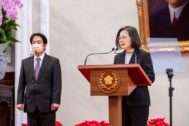
China - Taiwan
January — April 2022Taiwan and China Seek Lessons from Ukraine as Taiwan’s International Position Strengthens
The year 2022 in cross-Strait relations began quite predictably. Both sides repeated their calls for reconciliation, but in completely incompatible terms. Chinese leaders signaled somewhat obscurely that a new tougher Taiwan policy might be announced at the Chinese Communist Party’s Twentieth Party Congress scheduled for this fall, which could further increase cross-Strait tensions. This predictability was upended by Russia’s invasion of Ukraine. China insisted that this international confrontation had no lessons for the purely domestic matter of reunifying Taiwan. Nonetheless, China, Taiwan, and the US have all begun seeking military lessons from the Ukraine War. Taiwan and the US have intensified their discussion as to whether and how aggressively Taiwan should adopt an asymmetric defense relying on the small portable weapons—Javelins, Stingers, and others—that have thus far proven so successful in Ukraine. Diplomatically, the Biden administration has struggled to reassure China that it continues to honor the One-China Policy introduced in the Shanghai Communique 50 years ago even as it signals renewed support for Taiwan’s security. China’s support for Russia has antagonized Europe, Taiwan continues to enjoy success in international diplomacy, and Pacific allies Japan and Australia have become more explicit in their support for cross-Strait stability.
In Taiwan domestic politics, President Tsai Ing-wen is in the strongest position of any Taiwan president midway through a second term after leading her Democratic Progressive Party (DPP) to victories in a local by-election and a local recall effort, both called by the opposition Nationalist Party (Kuomintang or KMT). If the DPP does well in regularly scheduled local elections this fall, that success may set the stage for a confrontation with Xi Jinping as he begins his history-making third term as general secretary of the modern Communist Party.

China - Taiwan
September — December 2021Taiwan Gains Ground Internationally, but Will China Retaliate?
At the end of 2021, Taiwan and President Tsai Ing-wen stand in as strong a position as they have enjoyed in years. Taiwan has parlayed its opening of a representative office in Lithuania and Beijing’s sanctions against Lithuania into public support from other European nations. For the first time Taiwan was invited to a US multilateral event, President Biden’s Democracy Summit. On Dec. 18 Tsai unexpectedly defeated four opposition Kuomintang (KMT)-sponsored referendums that would have reversed a series of her executive actions as president, one of which would have obstructed her efforts to move forward on a bilateral trade agreement with the US. These victories effectively gave the Tsai administration a mid-term vote of confidence and embarrassed newly elected KMT Chairman Eric Chu Lilun. Chinese President Xi Jinping used the anniversary of the 1911 Xinhai revolution to underscore that reunification of Taiwan with the mainland would be the measure of the Communist Party’s success in rejuvenating China. Repeated Chinese air sorties into Taiwan’s Air Defense Identification Zone (ADIZ) made clear China’s willingness to employ coercive tactics short of war to advance its aims. The combination of Taiwan’s successes and China’s determination to subjugate Taiwan may presage a contentious cross-Strait 2022.

China - Taiwan
May — August 2021Cross-Strait Tension Increasing Beneath a Surface Calm
Cross-Strait tensions intensified between May and August 2021, despite the superficial calm that generally prevailed after the dramatic confrontations earlier in the year. China again blocked Taiwan’s participation at the World Health Assembly (WHA), and Xi Jinping reaffirmed the Communist Party’s commitment to the peaceful reunification of Taiwan at the Party’s 100th anniversary. Chinese military flights into Taiwan’s Air Defense Identification Zone were almost routine until China launched 28 sorties in a single day to protest the G7 summit’s endorsement of Taiwan’s participation in the WHA. The Biden administration announced its first arms sales to Taiwan. Several countries, most notably Japan and Australia, made their strongest statements ever in support of Taiwan. Lithuania announced it would permit the opening of an unofficial “Taiwanese” representative office. Beijing withdrew its ambassador from Lithuania and told Lithuania to withdraw its ambassador from Beijing. The US dismissed fears that its withdrawal from Afghanistan might portend abandonment of Taiwan. In coming months, Taiwan faces three potential turning points: Taiwan’s opposition Nationalist Party will elect a new chair; a referendum could overturn the opening of Taiwan’s market to US pork; and the US has signaled it will invite Taiwan to President Biden’s democracy summit despite threats of military retaliation by China.
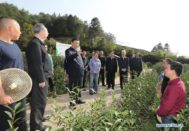
China - Taiwan
January — April 2021Taiwan Prospers, China Ratchets Up Coercion, and US Support Remains “Rock-solid”
For the leadership of Taiwan, the significance for Taiwan’s relationships with the US and China of the end of the Trump administration and the arrival of the Biden administration formed the defining concern as 2021 began. Taiwan welcomed two steps that the Trump administration took in its waning days: announcing a visit to Taiwan by the US ambassador to the UN (even though it was later cancelled) and repudiating the longstanding Taiwan Contact Guidelines, which was widely seen in Taiwan as overly restrictive. Taiwan’s anxieties regarding the Biden administration were quickly allayed, as incoming senior officials repeatedly called US support for Taiwan “rock solid” and issued new far less restrictive Guidelines. Taiwan also benefited from unusually direct expressions of support from Japan and other international partners.
Taiwan’s economy continued to boom despite the pandemic, but its dominance in high-end computer chip production became the subject of worries by US officials and industry groups over supply chain security. China’s military activities near Taiwan included two days of especially intense activity, which were clearly intended to signal its displeasure with the Biden administration’s support for Taiwan. China also banned the import of Taiwanese meat and pineapples and announced preferential treatment for Taiwan investors in mainland agriculture, all clearly targeted at disrupting support for Taiwan’s ruling Democratic Progressive Party and President Tsai Ing-wen among its rural political base. Both strategies appeared more likely to backfire than not. Increasing tensions between the US and China, especially over Taiwan, have led to concerns on all sides that a diplomatic or military confrontation may be growing more likely.
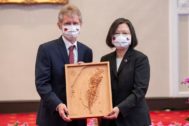
China - Taiwan
September — December 2020Overcoming COVID-19, Navigating US–China Tensions, and Anxiously Awaiting a New US Administration
Taiwan’s successful management of COVID-19 infections and the pandemic’s economic impact has elevated Taiwan’s international profile and President Tsai Ing-wen’s already high domestic approval ratings, but did little to ameliorate Taiwan’s confrontation with mainland China. Growing US–China economic and security tensions have continued to swirl around the island. Chinese air and naval forces have increased intimidation operations around Taiwan, with the Chinese media threatening that People’s Liberation Army (PLA) aircraft might even overfly the island. Taiwan has committed to increasing its defense budget and upgrading its reserve forces, and the US approved a series of military sales that are more closely aligned with Taipei’s porcupine strategy than some earlier high-profile sales. Taiwan’s IT companies have struggled to preserve their production base in China, while assuring the US that they would not contribute technology to US-sanctioned Chinese companies. They also opened facilities in third countries and the US in order to ensure US market access and political support.
Tsai’s decision in late August to allow imports of US pork treated with ractopamine was intended to reopen negotiations with the US on a bilateral trade agreement and it was driven by a strategic calculation that closer economic ties with the US would advance the island’s economy and security. That move caused a storm of domestic opposition, led by the Kuomintang (KMT) but with no response from the US Trade Representative, a combination that risks undermining the initial successes of her second term in office. The election of Joe Biden caused anxiety in Taiwan that the new Democratic administration, in an effort to reduce tensions with China, might be less supportive of Taiwan than President Trump has been.

China - Taiwan
May — August 2020Taiwan Navigates US-China Tensions as it Manages the Effects of COVID-19
Simmering tensions across the Taiwan Strait were a concern in May at the World Health Assembly meeting, along with President Tsai’s second inauguration, China’s National People’s Congress, and the 15th anniversary of the Anti-Secession Law. The beginning of Tsai’s second term was defined by Taiwan’s success in overcoming the health and economic impacts of COVID-19. Taiwan failed to win a seat at the World Health Assembly, but won unusually broad and public support from Washington and other typically silent partners. Taiwan offered assistance to victims of the Beijing’s National Security Law for Hong Kong, prompting Beijing to warn of Taiwan’s “black hand.” Taiwan’s ties with the US were showcased by the August visit of Secretary of Health and Human Services Alex Azar to Taipei.
Elsewhere, seeking to jumpstart negotiations on a bilateral trade agreement with the US, Tsai announced that Taiwan will allow imports of US pork and beef. The Nationalist Party’s recent presidential candidate Han Kuo-yu was recalled as Kaohsiung mayor and replaced by DPP candidate Chen Chi-mai. Meanwhile, the new KMT leadership’s initiative to sever ties to the “1992 Consensus” provoked generational dissension and a sharp warning from Beijing. Lee Teng-hui was mourned at his death as a democratic hero.
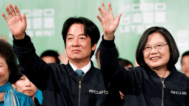
China - Taiwan
January — April 2020Coronavirus Embitters Cross-Strait Relations
After President Tsai Ing-wen won re-election and her Democratic Progressive Party retained its legislative majority, COVID-19 dominated the news, further embittered cross-strait relations, and provoked a sharp confrontation over Taiwan’s involvement in the World Health Organization. Beijing conducted more military operations near the island in response to concern that Taiwan is pushing independence, and the Trump and Tsai administrations strengthened ties. The opposition Kuomintang chose a younger, reform-minded leader following the latest in a series of defeats.
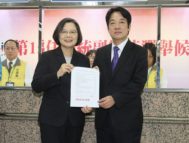
China - Taiwan
September — December 2019Election Portends Continued Tension
President Tsai Ing-wen triumphed over her populist Kuomintang (KMT) opponent Han Kuo-yu in Taiwan’s January 11, 2020 presidential election, garnering 57.1% of the vote to Han’s 38.6%. Tsai’s Democratic Progressive Party (DPP) also retained its majority in the Legislative Yuan (LY), albeit with the loss of some seats to the KMT and third parties. While there has been considerable attention to Beijing’s influence operations, the election illustrated Beijing’s limited ability to manipulate Taiwan elections. The outcome portends continued deadlock and tension in cross-strait relations in the coming months. Meanwhile, Taipei and Washington have strengthened ties by launching a series of bilateral and multilateral cooperative projects, intended in part to counter both Beijing’s influence operations and its continuing diplomatic, economic, and military pressures on Taiwan.
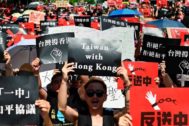
China - Taiwan
May — August 2019Hong Kong Impacts Taiwan Elections
The coming elections in Taiwan have shaped cross-strait relations. To a surprising degree, Hong Kong demonstrations have influenced the early campaign, helping President Tsai Ing-wen win her party’s nomination and requiring opposition candidates to reject Beijing’s “one country, two systems” more firmly than they would have otherwise. In the midst of US-China tensions, Washington has approved two major arms sales to Taiwan and taken other steps to improve US-Taiwan relations. Beijing opposes Tsai and has taken steps publicly and behind the scenes to boost the KMT’s populist candidate, Kaohsiung Mayor Han Kuo-yu. Beijing’s hardline response to Hong Kong demonstrations will likely continue to benefit Tsai as the election approaches in January.
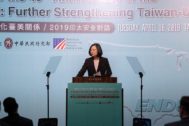
China - Taiwan
January — April 2019Troubling Tensions
The year began with General Secretary Xi Jinping and President Tsai Ing-wen making major statements that underline the fundamental gap between the Chinese Communist Party (CCP) and Taiwan. In the face of Beijing’s continuing pressure on Taiwan, Washington and Taipei took steps to strengthen relations and celebrate the 40th anniversary of the Taiwan Relations Act (TRA). In Congress, members proposed new measures, some of which challenge the established framework for US relations with Taiwan and China. Beijing repeatedly protested these efforts and in April sent two PLA fighters deliberately across the midline of the Taiwan Strait for the first time in 20 years in an ill-defined warning. In Taiwan, maneuvering for the 2020 elections has begun creating a confusing situation with unclear implications for cross-strait and US-Taiwan relations.
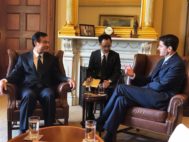
China - Taiwan
September — December 2018DPP Suffers Defeat
The Democratic Progressive Party (DPP) suffered a stunning defeat in Taiwan’s November local elections. Although local issues and personalities were the focus of the campaign, cross-strait economic issues did play a role. The Kuomintang’s (KMT) revival, which improves its prospects in the 2020 legislative and presidential elections, was welcomed in Beijing. While Taipei continues to be concerned about seriously strained US-China relations, Taipei and Washington continue to strengthen their ties.

China - Taiwan
May — August 2018Tsai Firm in the Face of Pressure
Beijing has ratcheted up pressure on President Tsai Ing-wen, while also promoting Taiwan’s integration with China. In response, Tsai has strengthened ties with major powers and modestly increased support for defense. Despite Chinese and domestic pressures, Tsai has adhered to her cross-strait policy. Taiwan’s November local elections could have implications for the 2020 presidential election and future cross-strait relations. Beijing remains concerned about US policy toward Taiwan. The Trump administration has taken steps to support Taiwan, but the president appears at times to see Taiwan as an element useful in US-China negotiations. The American Institute in Taiwan (AIT) dedicated its new office building in Taiwan, but no Cabinet official participated.
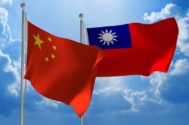
China - Taiwan
January — April 2018Taiwan Caught Between US and China
General Secretary Xi Jinping maneuvered the Chinese Communist Party (CCP) into removing term limits so that he can lead China indefinitely. Beijing has increased pressure on Taiwan, but also rolled out new measures aimed at increasing Taiwan’s economic and social integration with the mainland. On Taiwan, pro-independence elements continue pressing President Tsai Ing-wen. The passage of the Taiwan Travel Act (TTA), which was generally welcomed in Taipei, created a new US-China controversy. The appointment of John Bolton as national security advisor and the Trump administration’s tariff and technology actions against China have renewed fears in Taipei that Taiwan will become a bargaining chip or suffer collateral damage in a US-China confrontation.

China - Taiwan
September — December 2017Continuity After 19th Party Congress
Defying some predictions, the outcome of the 19th National Congress of the Chinese Communist Party indicates there will be no significant change in Beijing’s policy toward Taiwan. Beijing will continue to demand that President Tsai Ing-wen accept the 1992 consensus and pressure on her administration will be sustained. In Taiwan, Tsai has supported domestic actions that Beijing fears are weakening cross-strait ties and her pro-independence supporters continue to press for steps that risk increasing tensions. Tsai has also urged Beijing to join in finding a new model for their relations. Beijing’s pressure on Taiwan is stimulating calls in Washington for policies that are more supportive of Taiwan. These developments in Taiwan and Washington have in turn triggered warnings from Beijing.

China - Taiwan
May — August 2017China Increases Pressure, Tsai Holds the Line
In the run-up to the 19th Party Congress, Beijing has pursued an inflexible policy toward Taiwan, consistently blocking its international participation, establishing diplomatic relations with Panama, and conducting military exercises around Taiwan. Despite such pressures, President Tsai, whose priorities are domestic economic and social reform, has not changed her policy that neither accepts nor explicitly challenges Beijing’s one-China principle, and she has urged Beijing to join in seeking a new formula. With the US Congress expressing increased support for Taiwan, the Trump administration approved a new arms sales package and took other steps to improve ties with Taiwan. Beijing has warned Washington about closer ties with Taipei, raising the prospect that Taiwan will again become a divisive issue in US-China relations. In the absence of dialogue, unstable and risky cross-strait relations will continue in the months ahead.
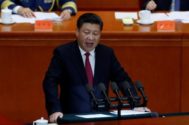
China - Taiwan
January — April 2017Adrift Without Dialogue
In February, President Trump told President Xi Jinping that the US would honor its one-China policy. This eased concern that the new administration would radically change US policy toward Taiwan, but it remains unclear how the Trump administration will deal with specific Taiwan issues. Relations between Beijing and Taipei have continued to be in an unstable but calm state in the early months of 2017. The formal channels of dialogue remain closed and no significant effort has been made to reopen them. In the meantime, practical issues have been dealt with, sometimes constructively but often in ways that exacerbate the lack of trust. This unstable and risky situation will likely continue in the months ahead.
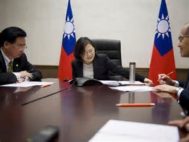
China - Taiwan
September — December 2016Adjusting to New Realities
After President Tsai’s inauguration, Beijing continued to press her to accept the 1992 Consensus on one China. When China blocked ICAO from inviting Taipei in September, Tsai reacted sharply. In her “Double Ten” remarks, she reaffirmed her cross-strait policy and said she would neither give in to pressure nor return to past confrontational actions. In October, CCP General Secretary Xi Jinping made remarks implying Beijing’s understanding that Tsai would not endorse one China. The election of Donald Trump created in Taipei both hope of friendship from Republicans and concern Taipei could become a pawn in Trump’s bargaining with China. Trump’s tweets about his telephone conversation with Tsai and comments about one China and trade have sparked intense speculation and uncertainty about their implications for cross-strait and US relations with Taiwan and China.
China - Taiwan
May — August 2016Relations Better than Expected
Democratic Progressive Party (DPP) Chairperson Tsai Ing-wen was inaugurated as president on May 20. In her inaugural address, she did not accept “one China” but did reach out further toward Beijing. Beijing gave her address an “incomplete” grade and has continued to press her to accept the 1992 Consensus. Despite this fundamental divide and deep mutual mistrust, the two sides have been able to handle some issues in a pragmatic manner. Although the formal communications channels have been suspended by Beijing, contacts at other levels continue under the network of cross-strait agreements. Many issues will continue to complicate the management of relations. However, Tsai remains committed to maintaining stable relations and Xi Jinping, preoccupied with other challenges, prefers to avoid a confrontation with Taiwan.
China - Taiwan
January — April 2016Taiwan Sets a New Direction
Democratic Progressive Party (DPP) Chairperson Tsai Ing-wen was elected president on Jan. 16 by a decisive margin, and for the first time the DPP won a majority in the Legislative Yuan (LY) election. This outcome has set Taiwan on a new course. Since then, Tsai has adhered to her pledge to maintain the status quo and peace in the Taiwan Strait and has taken steps to continue reaching out to Beijing. Beijing reacted calmly to the election and has repeatedly said the election will not change the basic framework of its peaceful development policy toward Taiwan. However, Beijing is waging a focused campaign to press Tsai to accept the 1992 Consensus in her inaugural address on May 20. Even if she does not fully meet Beijing’s demands, as is expected, it will be in the interest of both sides to avoid confrontation after May 20 in what is likely to be a strained relationship.
China - Taiwan
September — December 2015A Meeting and a Campaign
General Secretary Xi Jinping and President Ma Ying-jeou held the historic first Cross-Strait Leaders Meeting in Singapore, capping seven years of collaborative work to build stable and constructive cross-strait relations. On Taiwan, the Democratic Progressive Party (DPP) has conducted a well-run campaign, likely leading on Jan. 16 to Tsai Ing-wen winning a strong majority mandate in the presidential election and the KMT and its allies losing control of the Legislative Yuan (LY) for the first time. After the election, Tsai and Xi will share responsibility for avoiding a confrontation that is in neither of their interests.
China - Taiwan
May — August 2015KMT Disarray Shapes Campaign
The Kuomintang (KMT) Party’s mismanagement of the selection of its presidential candidate has left the party in disarray and increased the prospect that Democratic Progressive Party (DPP) candidate Tsai Ing-wen will win the presidency along with a majority in the Legislative Yuan (LY) elections. Faced with the prospect of DPP victories, Beijing has sent mixed messages to Taiwan, while voicing its confidence in preserving the accomplishments of the peaceful development policy for the long-term. Against this background, the Ma administration and Beijing have struggled to keep cross-strait relations moving forward.
China - Taiwan
January — April 2015Looking to a Different Future
Taipei’s relations with Beijing have been adrift with the Ma administration in a reactive mode. The main interactions have been on unexpected issues – China’s M503 air route and Taiwan’s effort to join the Asian Infrastructure Investment Bank (AIIB) – and results were mixed. Meanwhile all players are preparing for a different future. The KMT is trying to reform itself; new chairman Eric Chu Li-lun visited China and met General Secretary Xi Jinping in early May. Beijing is focused on working with the new KMT and on deterring the DPP from returning to office in 2016. The DPP and Chairperson Tsai Ing-wen have begun defining its policy toward Beijing before Tsai visits Washington in June.
China - Taiwan
September — December 2014Cross-Strait Relations on Hold
Campaigning for local elections in Taiwan delayed any progress toward resolving the deadlock in the Legislative Yuan over cross-strait issues. While emphasizing continuity in its peaceful development policy, Beijing is concerned over the Democratic Progressive Party’s increasing prospects and consequently has laid down markers aimed at the party. Student protests in Hong Kong underlined the fundamental political differences between Taiwan and the mainland and occasioned some sharp exchanges between the Ma administration and the Chinese Communist Party leadership. The Kuomintang’s large defeat in the local elections surprised everyone and creates new challenges for Beijing in the lead-up to Taiwan’s presidential and legislative elections in early 2016.
China - Taiwan
May — August 2014Beijing Pursues Steady Course despite Headwinds
In early May, General Secretary Xi Jinping made clear that Beijing would adhere to its peaceful development policy toward Taiwan in the wake of the student-led Sunflower Movement. In June, TAO Minister Zhang Zhijun made a first official visit to Taiwan reaching out to broader segments of Taiwan society and meeting Kaohsiung Mayor Chen Chu. DPP obstructionism has continued to prevent the LY from action on cross-strait issues. Tsai Ing-wen was elected Chair of the DPP in July and indicated there will be no change in basic DPP policy toward the mainland.
China - Taiwan
January — April 2014A Breakthrough and a Deadlock
In February, officials from Beijing and Taiwan met publicly in their official capacities for the first time since 1949. Both sides characterized this breakthrough as a step forward in cross-strait relations. However in Taipei, partisan maneuvering in committee and an unprecedented occupation of the Legislative Yuan by students created a deadlock blocking approval of the Cross-Strait Service Trade Agreement concluded last June. While Beijing and Taipei have tried to maintain progress, these domestic developments in Taiwan represent a serious challenge both for President Ma and Beijing.
China - Taiwan
September — December 2013Building Trust?
Beijing is increasingly exploring ways to address cross-strait political issues and is promoting agreement on a “one China framework” as the way to build mutual trust. However, differences remain very apparent, at least for the present. The first formal exchange of visits by officials is being planned, raising important policy implications. Taipei’s participation in the International Civil Aviation Organization Assembly as a guest was a positive step while Beijing’s unilateral announcement of an East China Sea ADIZ overlapping in part Taiwan’s ADIZ has set back efforts to build trust.
China - Taiwan
May — August 2013Bumps along the Road
The slow steady improvement of cross-strait relations hit some not unexpected bumps in recent months. Domestic politics in Taiwan, particularly partisan actions by the opposition DPP, have delayed Legislative Yuan action on important cross-strait matters. Despite these domestic troubles, Beijing is maintaining a steady course and seems confident about the long-term direction of President Ma’s policy. Track II political dialogues are growing, including those involving the DPP, which launched a series of meetings on its policy toward Beijing. Taiwan has been invited to attend the triennial Assembly of the International Civil Aviation Organization (ICAO) as a special guest of the ICAO Council.
China - Taiwan
January — April 2013Relative Calm in the Strait
The contrast between tensions elsewhere in the region and the relative calm in the Taiwan Strait was clearly in focus. In an event commemorating the 20th anniversary of cross-strait exchanges, President Ma said progress is “an example for East Asia and the world by demonstrating peaceful resolution of disputes.” Taipei and Beijing continue to make slow but steady progress in expanding and institutionalizing ties. Health and crime issues, which provoked controversy in the past, have been addressed and talks on an exchange of unofficial representative offices have begun. Nevertheless, fundamental policy divergences and differences over the pace and scope of interaction will likely place real limits on future integration. Taipei and Tokyo successfully concluded a landmark fisheries agreement that constructively focuses on resource cooperation.
China - Taiwan
September — December 2012New Faces, Familiar Policies
Leadership changes have occurred on both sides of the strait. As predicted, the 18th Party Congress saw Xi Jinping appointed as general secretary in Beijing. In Taipei, President Ma announced in September a complete reshuffle of his cross-strait and foreign policy team. In both cases, the personnel changes do not foreshadow any policy changes in the coming months. While Ma remains unwilling to address political issues in direct negotiations, some interesting Track 2 dialogues occurred. In October, Beijing gave visiting DPP politician Hsieh Chang-ting unusual high-level attention, and following his return Hsieh has tried, thus far unsuccessfully, to promote change in DPP policy. Against the backdrop of increasing tensions over the Diaoyu Islands, Ma is focused on asserting Taiwan’s interests primarily through his East China Sea Peace Initiative.
China - Taiwan
May — August 2012A Year for Consolidation
President Ma’s inaugural mentioned no new initiatives, confirming that this would be a year for consolidating relations rather than making breakthroughs in cross-strait relations. While Beijing understands Ma’s domestic position, it continues nudging Ma and Taiwan to move beyond economic issues. The 8th ARATS-SEF meeting in August finally concluded the long-stalled investment agreement – a significant step – but only by finessing key contentious issues. Debates within the DPP over its policy toward Beijing continue. However, initial decisions by new DPP chairman Su Tseng-chang indicate that the party is not yet willing to adjust its policy. President Ma has taken steps to underline the ROC claims to the Diaoyutai Islands.
China - Taiwan
January — April 2012Post-Election Continuity
In January, President Ma Ying-jeou won re-election and the KMT retained its majority in the legislature. Voters endorsed Ma’s gradual approach to developing constructive relations with the Mainland. In Beijing, the outcome validated President Hu’s “peaceful development” policies. Both sides have indicated there will be continuity in cross-strait relations with a focus on a busy economic agenda. While understanding the domestic factors constraining Ma’s willingness to discuss political issues, Beijing has emphasized the importance of building political trust and strengthening a common Chinese heritage. Meanwhile, the DPP defeat provoked an internal debate on the party’s policy toward Beijing, but no clear picture has emerged on whether or how party policy might change.
China - Taiwan
September — December 2011Toward a Crucial Election
The campaign leading to the Taiwan’s Jan. 14 presidential election has dominated cross-strait developments. Opposition candidate Tsai Ing-wen has continued her rejection of the “1992 consensus” and criticized President Ma Ying-jeou for suggesting he might consider negotiating a peace accord with Beijing. Meanwhile, Beijing has emphasized its wish to further develop relations on the basis of the “1992 consensus,” without which relations will regress. Therefore, the outcome of the upcoming elections will have a decisive impact. Ma’s re-election would permit further gradual progress; Tsai’s election will likely lead Beijing to suspend dialogue and domestic pressures would probably produce a tougher policy toward Tsai’s administration.
China - Taiwan
May — August 2011Progress Slow as Taiwan Campaign Begins
There has been some progress in implementing the Economic Cooperation Framework Agreement (ECFA) and other existing pacts, but differences continue to prevent finalization of the long-pending investment protection agreement. Beijing has criticized opposition candidate Tsai Ing-wen’s cross-strait policy platform saying it would lead to a breakdown in dialogue and cooperation. Sea trials of Beijing’s first aircraft carrier were symbolic of the PLA capabilities that increasingly threaten Taiwan. Reports indicate that Taipei and Washington have agreed on the program to upgrade Taiwan’s existing F-16A/B fighters with congressional notification expected in September.
China - Taiwan
January — April 2011Steady as She Goes
The Cross-Strait Economic Cooperation Committee held its first meeting in February, which represents an important step in implementing the Economic Cooperation Framework Agreement. Both Beijing and Taipei believe this year will see a steady consolidation of cross-strait relations, with only a few new agreements. The backdrops of this modest prospect are the leadership transitions underway on both sides of the Taiwan Strait. Evidence of PLA modernization confirms that military capabilities threatening Taiwan continue to increase, confronting Washington with difficult decisions on future arms sales to Taiwan.
China - Taiwan
October — December 2010Looking ahead to 2012
The pace of progress in cross-strait relations has slowed as agreement continues to take longer than anticipated. A medical and healthcare agreement was signed in December, but consensus on an investment protection agreement was not reached and establishment of the Cross-strait Economic Cooperation Committee (CECC) has been delayed. The mayoral elections in November saw the opposition Democratic Progressive Party (DPP) receiving more votes than the ruling Kuomintang (KMT). Both parties are now gearing up for the presidential election in March 2012. Consequently, campaign politics in Taiwan and jockeying in preparation for the 18th Party Congress in Beijing will dominate the way Beijing, President Ma Ying-jeou, and the opposition in Taiwan approach cross-strait issues in the year ahead.
China - Taiwan
July — September 2010Slow, Steady Improvements
This has been a quiet but constructive quarter in cross-Strait relations. Taipei and Beijing were focused on ratifying and beginning implementation of the Economic Cooperation Framework Agreement (ECFA). With Beijing’s agreement, Singapore and Taipei announced that they would consider negotiating a WTO-consistent economic cooperation agreement. This important flexibility by Beijing allows President Ma to show that ECFA has opened the door at least slightly to Taiwan’s involvement in regional trade liberalization. Despite Washington’s approval of small commercial arms sales, Beijing indicated a willingness to resume military exchanges with Washington. Nevertheless, arms sales to Taiwan remain a threat to US-China relations.
China - Taiwan
April — June 2010Economic Cooperation Framework Agreement Signed
After six months of arduous negotiations, China and Taiwan signed an Economic Cooperation Framework Agreement (ECFA), including an “early harvest” list of tariff reductions. The agreement, which provides a basis for further integration of the two economies, is a milestone in institutionalizing cross-Strait relations. On Taiwan, opposition politicians continue to criticize the ECFA but months of discussion and debate have led to a gradual increase in public support and acceptance. The issue of US arms sales to Taiwan continues to complicate US-China relations. The Democratic Progressive Party’s consideration of a new 10-year platform has revealed an ongoing internal difference over cross-Strait policy. The coming quarter will see the Legislative Yuan’s review of the ECFA, Taiwan’s quest for free trade agreements with trade partners and jockeying in the run-up to the November municipal elections on Taiwan.
China - Taiwan
January — March 2010ECFA and Domestic Politics
The interaction between economic negotiations and Taiwan domestic politics will dominate cross-Strait relations this year. Formal negotiation of an Economic Cooperation Framework Agreement (ECFA) began in January and both sides now talk hopefully of completing the negotiations by June. On Taiwan, recent election losses make timely conclusion of the ECFA on terms welcomed by Taiwan voters important for President Ma Ying-jeou and the Kuomintang (KMT) party’s political fortunes. The announcement of a US arms sales package in January was welcomed by Ma, but predictably created tensions in US-China relations – tensions that raise the stakes when the Obama administration considers Taiwan’s request for F-16 C/D aircraft.
China - Taiwan
October — December 2009Moving ahead Slowly
Taipei and Beijing resumed progress on economic issues by completing the Memorandums of Understanding (MOUs) on cooperation in regulating the financial sector and signing three technical agreements at the fourth round of SEF-ARATS talks. Informal talks concerning an Economic Cooperation Framework Agreement (ECFA) continued but no date for starting formal negotiation has been announced. While the pace of progress is now slow largely because reaching compromises on substantive economic issues has proven to be time-consuming, these agreements further integrate the two economies. Taipei has continued to resist pressure from Beijing to address political issues about which opinion in Taiwan remains deeply divided. Cross-Strait trade has recovered quickly from the precipitous drop a year ago and should surpass its pre-recession peak in December. Slow progress is likely to continue in the coming months.
China - Taiwan
July — September 2009Temporarily in the Doldrums
Beijing and Taipei made little progress in cross-Strait relations this quarter. Typhoon Morakot and other extraneous factors combined to frustrate progress but did not change the positive momentum. Preparations are underway for talks on an Economic Cooperation Framework Agreement (ECFA) and the fourth round of SEF-ARATS talks later this year. Cross-Strait trade is beginning to recover from the precipitous decline caused by the great recession and the first mainland investments in Taiwan, although small, have been approved. There were no significant developments on security issues. Progress in better relations should resume in the months ahead.
China - Taiwan
April — June 2009Moving Relations toward a New Level
Beijing and Taipei made significant progress in improving cross-Strait relations this quarter. In May, “Chinese Taipei” participated for the first time as an observer in the World Health Assembly. In April, the third round of ARATS-SEF talks produced three new agreements and an understanding to open Taiwan to investors from the mainland. These developments have been well received in Taiwan. The progress over the past year has produced increasing de facto dealings between government officials from the two sides. The recent precipitous decline in cross-Strait trade appears to be bottoming out, and Beijing has taken steps to help Taiwan economically. Although there is still no indication that Beijing has reduced the military forces targeted at Taiwan, Hu Jintao has called for preparations concerning a peace agreement and confidence building measures.
China - Taiwan
January — March 2009New Economic Challenges
Beijing and Taipei have been making preparations for the third round of ARATS-SEF talks to be held in May or June at which time additional agreements on finance, flights, and crime are expected. The global recession has precipitated a dramatic decline in cross-Strait trade and that, in turn, has contributed to accelerated plans to negotiate a comprehensive cross-Strait economic agreement. However, the planning for such an agreement has produced a storm of opposition protest in Taiwan, which represents the most serious challenge yet to President Ma’s cross-Strait policies. Officials on both sides are speaking optimistically about finding a formula under which Taipei could be an observer at the World Health Assembly (WHA) in May. Although defense reports from both sides acknowledge reduced tensions, there is as yet no sign that Beijing will reduce the military threat directed at Taiwan.
China - Taiwan
October — December 2008More Progress, Stronger Headwinds
Beijing and Taipei continued to work cooperatively through various dialogue channels to improve cross-Strait relations. The focus this quarter was on the first ever visit by a “designated representative” of the Chinese government to Taiwan – the visit of ARATS Chairman Chen Yunlin in November, when four agreements were signed. This process is gradually establishing a degree of trust in this long-troubled relationship. However, a vocal opposition minority in Taiwan disrupted the Chen visit and forced President Ma Ying-jeou to make adjustments. Despite the progress, there is still no evidence that Beijing has taken any steps to reduce its military threat directed at Taiwan. President Hu’s new six-point statement and Taipei’s initial reaction to it highlight the continuing gap between their positions. The global economic crisis is confronting the relationship with new challenges, the scope of which is not yet clear. Internationally, Taiwan’s desire for participation in the WHO will be a test of this evolving relationship next spring.
China - Taiwan
July — October 2008Progress in the Face of Headwinds
Leaders in Taipei and Beijing continue to pursue improved cross-Strait relations despite political pressures and domestic criticism. The initial agreements are being implemented and behind-the-scenes negotiations are laying the ground for a second tranche of agreements when ARATS Chairman Chen Yunlin visits Taiwan in late October or early November. The Beijing Olympics occasioned some tensions over terminology until the leadership in Beijing stepped in to craft a satisfactory solution. Taipei’s modest proposal at the UN aimed at participation in UN specialized agencies was rejected by Beijing. However, a debate is underway in Beijing on how to address Taipei’s demand for increased international space and the Ma administration remains hopeful that Beijing will eventually devise a more forthcoming response. On October 3, the Bush administration notified Congress of a $6.5 billion arms package for Taiwan.
China - Taiwan
April — June 2008Dialogue Resumes in Relaxed Atmosphere
Events in cross-Strait relations have unfolded rapidly since Ma Ying-jeou’s election in March. After a nine-year hiatus, formal dialogue between Beijing’s Association for Relations Across the Taiwan Strait (ARATS) and Taipei’s Straits Exchange Foundation (SEF) resumed on June 12 in Beijing. These two nominally unofficial associations reached agreements on weekend charter flights and Chinese tourism. The atmosphere of cross-Strait relations in this honeymoon period is so relaxed and consultative that it is hard to remember the bitter tensions that poisoned relations just a few months ago. However, political constraints on Presidents Hu Jintao and Ma Ying-jeou will make progress difficult, particularly on the international relations and security issues that are crucial to a lasting relaxation of tensions.
China - Taiwan
January — March 2008Taiwan Voters Set a New Course
In January, Taiwan’s voters delivered a stunning defeat to the Democratic Progressive Party in the Legislative Yuan elections. These results both foreshadowed and influenced the resounding victory Kuomintang candidate Ma Ying-jeou won in the March presidential election. Most importantly for cross-Strait relations, the UN referendum promoted by Chen Shui-bian failed to pass. Beijing’s disciplined avoidance of overt interference in this year’s elections paid off. Beijing and Washington both breathed sighs of relief. Beijing now faces major challenges. First, how to avoid short-term actions that would undercut domestic support in Taiwan for Ma’s more positive attitude toward China and, over the longer term, how to seize the opportunity to promote more stable cross-Strait relations.
China - Taiwan
October — December 2007Beijing Keeps Its Cool
At the 17th Party Congress in October, Hu Jintao authoritatively reiterated Beijing’s desire for a peace agreement on the basis of the one China principle. Behind this positive public posture, Beijing remains deeply concerned about the referendum on joining the UN under the name “Taiwan” that Chen Shui-bian is relentlessly promoting. Yet Beijing has kept its rhetoric under control. It has pressed the U.S. to do more to stop the referendum and has worked with some success to mobilize international criticism of it. Washington has continued to make known to the public in Taiwan its reasons for opposing this referendum and, to underline the message, Washington has put Taiwan’s purchase of more F-16 fighter jets on hold. That Chen is pushing ahead with the referendum despite international opposition only confirms that his purpose is primarily election mobilization.
China - Taiwan
July — September 2007In the Throes of Campaign Politics
Beijing is preparing for the 17th Party Congress, projecting an image of orderly authoritarian politics. In Taiwan, the volatile and unpredictable democratic politics of the presidential campaign are raising issues and prompting expressions of serious concern in Beijing and Washington. The focal points have been President Chen Shui-bian’s quixotic appeals to join the UN as “Taiwan,” the Democratic Progressive Party’s (DPP) promotion of a referendum on UN membership under that name and DPP Chairman Yu Shyi-kun’s proposal for a new DPP resolution on making Taiwan a “normal country.” The strong international reaction to these maneuvers has not deterred Chen or the DPP from the referendum on UN membership that is driven by their domestic political calculations. However, the U.S. position did provoke debate and contributed to a DPP decision to reject the most provocative aspects of Yu’s proposals on the “Normal Country Resolution.” What the Taiwan voters will do remains to be seen. Against this background, it is hardly surprising that the few authorized cross-Strait contacts that have occurred have produced no results.
China - Taiwan
April — June 2007Dueling in the International Arena
Beijing has remained concerned that President Chen Shui-bian will provoke some new cross-Strait confrontation. For his part, Chen has continued to try to create a stronger sense of Taiwan identity during his remaining months in office. These have lead Beijing to be even more implacable in insisting that Taiwan be viewed as part of China. Much of the confrontation has been in the international arena: over the Olympics, in the WHO and other international organizations, and for diplomatic recognition. There has been little movement on cross-Strait functional issues. On the military front, Taipei has been somewhat more open about its development of offensive missiles, and the Legislative Yuan has finally appropriated funds to begin procurement of some elements of the arms package.
China - Taiwan
January — March 2007To Be Concerned or Not?
Despite the basic stability of cross-Strait relations, Beijing has been concerned this spring that Taiwan’s President Chen Shui-bian would somehow take steps to realize his dream of a new constitution for Taiwan. In contrast, Washington has been more impressed by the domestic constraints that make constitutional reform affecting Taiwan’s sovereignty all but impossible. President Chen has not abandoned his dreams, as he made explicit in this “four wants” speech, but he has focused on the more modest and achievable goal of heightening the public’s sense of Taiwan’s separate identity – steps that appeal to the Democratic Progressive Party’s core supporters and create realities his successor will have difficulty reversing. Treatment of Taiwan at the PRC’s National People’s Congress in March reflected the continuity of President Hu Jintao’s approach to Taiwan. Talks on Chinese tourism to Taiwan and on expanding cross-Strait charter flights have continued but no agreements have been announced. China’s anti-satellite test and another major increase in its defense budget have been sources of concern in Taipei, but the Legislative Yuan has not yet passed its arms procurement legislation.
China - Taiwan
October — December 2006Continuing to Inch Forward
As the year ends, cross-Strait tensions remain remarkably low. This is so despite President Chen Shui-bian’s continuing efforts to promote his Taiwanese nationalist agenda in ways that could threaten cross-Strait stability. However, as Chen is a seriously wounded lame duck, his influence is declining and his initiatives are often just rhetorical flourishes. Despite President Chen’s restrictive approach to cross-Strait economic ties, his administration finally approved some long-pending proposals for high-tech investments in China. Beijing continues to pursue President Hu Jintao’s policy of positive outreach to Taiwan. Discreet talks between designated associations have reportedly neared agreement on arrangements for Chinese tourism to Taiwan. Progress was made toward breaking the deadlock over arms procurement, with hope that some initial appropriations may be approved by the Legislative Yuan early in the new year. If any progress is to be made on functional issues next year, it will have to occur early before the sides become engaged in preparations for the 17th Chinese Communist Party (CCP) Congress and Taiwan’s elections.
China - Taiwan
July — September 2006More Small Steps
Corruption scandals and street protests calling for President Chen’s resignation have largely paralyzed policy making in Taipei. Beijing is concerned over President Chen’s playing the constitutional reform card to counter the campaign for his removal. Nevertheless, Taipei and Beijing undertook more small steps to ease restrictions on cross-Strait contacts. Beijing also continued active exchanges with the Kuomintang (KMT) opposition. Significant changes in Taiwan Affairs Office (TAO) personnel were announced, and the changes were viewed positively in Taipei. The PRC continued to outmaneuver Taiwan in the international arena, but at home Chen pushed his campaign for a stronger Taiwanese identity. The visit to Taipei of a Japanese vice minister of agriculture symbolized the increased contacts that have been taking place between Tokyo and Taipei. With the Democratic Progressive Party (DPP) set to release its proposals on constitutional reform, that issue is likely to reemerge as a source of cross-Strait tension.
Prosecutorial investigations of President Chen Shui-bian’s family and aides continued to provide fodder for a media frenzy in Taipei. Allegations about the president’s possible role in the mishandling of the Presidential Office Allowance for State Affairs for the first time directly touched the president. In August, former DPP activist Shih Ming-teh launched a “depose Chen” campaign to force Chen from office. This led to repeated demonstrations and counter demonstrations, and these events largely paralyzed policy-making in Taipei and raised concerns in Beijing.
In mid-September, Chen Yunlin, minister in Beijing’s TAO, made an unpublicized trip to Washington. Reportedly, he expressed concerns to U.S. officials that Chen might seek to rescue himself by provoking some incident in cross-Strait relations or by reneging on his promises concerning the constitutional reform issue to regain support from the DPP’s political base. The constitutional concerns were prompted by DPP plans to make public its proposals concerning a new constitution for Taiwan by the end of September. DPP Chairman Yu Shyi-kun was in Washington at the same time on a mission to reassure the U.S. that Taipei politics would remain stable and that the DPP’s constitutional proposals would not touch on sovereignty issues.
While release of the DPP constitutional draft(s) has been delayed, President Chen told a DPP seminar on constitutional reform in late September that he believed the time had come to reconsider the definition of the country’s territory in the constitution. Chen’s purpose was clearly to deflect attention from the scandals by making a controversial proposal that would appeal to his core DPP supporters. While there is no chance that any amendment concerning territory could actually be passed, this proposal was a clear deviation from Chen’s assurances to the U.S. on constitutional reform and an example of what Beijing fears. Politburo Standing Committee Member Jia Qinglin reacted promptly, warning of the dangers Chen is creating by promoting independence under the guise of constitutional reform. In Washington, the State Department said that adherence to President Chen’s commitments that constitutional reform would not touch on sovereignty issues, including the territorial definition, was very important to peace and “would be a test of the President’s leadership, dependability and statesmanship.” If information that has leaked out about the content of constitutional drafts under consideration by the DPP is accurate, the constitutional reform issue will soon re-emerge as a serious source of tension in cross-Strait and U.S.-Taiwan relations.
China - Taiwan
April — June 2006Despite Scandals, Some Small Steps
The political gridlock in Taiwan caused by the scandals swirling around President Chen Shui-bian’s family has overshadowed cross-Strait relations in recent weeks. Nevertheless, some small pragmatic steps have been taken by both sides. In April, despite Chen’s more restrictive policy on economic ties, Taipei finally approved investments in LCD production and computer-chip packaging and testing ventures. In May, a weakened Chen publicly reaffirmed his “four noes,” a step that was welcomed by Washington and to a lesser extent Beijing. In June, Taipei and Beijing announced that agreement had been reached on holiday, humanitarian, and limited cargo charter flights across the Strait, beginning later this year. In Geneva, the World Trade Organization (WTO) held its first review of Taiwan’s trade policies. PRC representatives participated, and the review was completed without the usual diplomatic histrionics. Relative calm and such small steps are the most that can be expected for cross-Strait relations in the coming months.
China - Taiwan
January — March 2006Missed Opportunities
The agreement to conduct an expanded round of direct cross-Strait charter flights during the 2006 Lunar New Year could have marked the resumption of progress on practical cross-Strait ties. However, reacting to his party’s defeat in the recent county elections, President Chen announced Jan. 1 his intention to more “actively manage” – meaning to tighten restrictions on – cross-Strait economic ties. Nevertheless, President Hu Jintao and other Chinese officials continued to signal their interest in expanding cross-Strait transportation, economic, tourism, and cultural ties. In late January, President Chen announced his intention to abolish the National Unification Council (NUC). His motives were primarily domestic, but the implications of this proposal sparked a sharp response from Washington and Beijing. In the end, Chen stopped short of abolishing the Council. Cross-Strait rhetoric has been heated, but tensions have not escalated. In late March, Chen began announcing steps to implement further restrictions on investment in China. The most serious result of these developments has been that opportunities for expanding mutually beneficial economic ties and for making progress on practical cross-Strait issues have once again fallen victim to President Chen’s domestic political maneuvering.
China - Taiwan
October — December 2005Will Cross-Strait Momentum Resume?
While 2005 has seen a fundamental shift toward more stable cross-Strait relations, developments were largely on hold for much of this quarter. Beijing continued to pursue cooperation with the opposition parties and to minimize dealings with the Chen Shui-bian administration. Beijing did not implement any further unilateral steps to expand cross-Strait exchanges. Economic ties continued to grow but at a slower pace. Then in November, working though private associations, Beijing and Taipei agreed to renew and expand the arrangements for charter flights at the coming Chinese New Year. With Taiwan’s local elections over, Taipei and Beijing will each need to decide whether to build on that base, as was not done in 2005, to tackle the other charter and tourism issues on the table. At present, it seems Beijing may be more willing to do so than President Chen. Progress on these and other economic decisions long pending in Taipei would serve Taiwan’s interests.
China - Taiwan
July — September 2005Beijing Prefers to Tango with the Opposition
The summer saw Beijing extending friendly gestures toward Taiwan – a welcome change. Beijing has worked to build on the visits by opposition party leaders in the spring, while seeking to marginalize President Chen Shui-bian’s administration. Initiatives that China could implement on its own have gone ahead, while those requiring cooperation from the Taiwan government have languished. China conducted its first joint military exercise with Russia in August, and structured the exercise so that people in Taiwan would see it as threatening. Nevertheless, partisan wrangling in Taipei continued to delay a decision on adoption of the supplemental arms budget. Cross-Strait trade continued to grow, but at a relatively slow pace. Beijing’s strategy to marginalize Chen will limit progress on cross-Strait functional issues and not necessarily rebound to Beijing’s long-term benefit.
China - Taiwan
April — June 2005Opposition Leaders Visit China
The visits of Kuomintang (KMT) chairman Lien Chan and People’s First Party (PFP) Chairman James Soong Chu-yu to China have ameliorated cross-Strait relations. Cross-Strait tensions and the fears of potential conflict so evident throughout 2004 have eased, and the controversy over Beijing’s Anti-Secession Law has faded into the past. The visits illustrated the potential for dialogue if a different government were in office in Taipei, and produced a new verbal formula that could bridge differences over preconditions for talks with a future government. However, the visits have poisoned the atmosphere between Beijing and the administration of Taiwanese President Chen Shui-bian. Despite speculation in Taipei, there is no prospect for political dialogue between the two. Furthermore, domestic politics is complicating the possibility for progress on functional issues such as transportation, agricultural exports, and tourism, which would be beneficial to both sides, particularly Taiwan.
China - Taiwan
January — March 2005A Little Sunshine through the Clouds
After burnishing its hardline credentials by announcing its intention to enact an anti-secession law (ASL) in December, Beijing took some significant steps toward improving cross-Strait relations in January by cooperating in New Year charter flights, stopping propaganda criticism of Taiwan President Chen Shui-bian, and sending Association for Relations Across the Taiwan Strait (ARATS) officials to Koo Chen-fu’s funeral in Taipei. For his part, Chen also took conciliatory steps by reaffirming his inaugural pledges concerning constitutional reform and appointing as new premier Hsieh Chang-ting, who quickly set a more moderate tone on contentious domestic and cross-Strait issues. Nevertheless, despite widespread criticism from Taiwan and the U.S., Beijing’s National People’s Congress adopted in March the anti-secession law (ASL), which emphasizes China’s pursuit of peaceful reunification but mandates that unspecified “non-peaceful means” be used if Taiwan seeks to secede from China. When the dust from the ASL controversy settles, the question will be whether Beijing and Taipei are able to follow up on the successful New Year charter flights by arranging further steps toward direct cross-Strait cargo and/or passenger flights.
China - Taiwan
October — December 2004Campaign Fallout
During the Legislative Yuan (LY) election campaign, President Chen Shui-bian again used Taiwanese identity issues to mobilize Democratic Progressive Party (DPP) supporters and reverted to talking fervently about his mission to give his people a new constitution in his second term. Such developments only confirmed Beijing’s distrust and criticism of Chen. The Bush administration also notched up public criticism, reflecting Washington’s growing frustration with and lack of trust in Chen. In October, Chen made some specific proposals on cross-Strait dialogue and charter flights. Beijing dismissed Chen’s dialogue proposal as insincere because it did not directly address the “one China” issue but deferred responding on the question of charter flights. The LY election in December unexpectedly renewed the pan-blue majority in the Legislative Yuan. Beijing and Washington breathed sighs of relief. Nevertheless, a week after the election, Beijing announced it would proceed to adopt an “Anti-Secession Law” in the Spring. While some believe 2005 will present a window of opportunity for progress on cross-Strait relations, it remains to be seen whether Beijing and Taipei will choose to adopt flexible approaches on the “three links,” the one area were some progress may be possible.
China - Taiwan
July — September 2004Unproductive Military Posturing
This quarter much attention was focused on unproductive military posturing. While some saw an increase in military tension, it is more accurate to say that both sides were using military exercises to signal the political resolve behind their declared policies. One real issue – whether Taiwan will invest more in its own defense – was hotly debated in Taipei, but the Legislative Yuan (LY) took no action on the proposal. The months leading up to Beijing’s Central Committee Plenum in September saw considerable speculation about policy differences between Jiang Zemin and Hu Jintao, including over Taiwan. Although Jiang completed his retirement at the Plenum, it remains to be seen whether Hu will make significant adjustments in Taiwan policy next year. In Taipei, the LY passed proposed constitutional amendments including provisions to use referendums to ratify future amendments. Despite its past allergy to Taiwan referendums, Beijing reacted calmly. With the December LY elections in the offing, the standard dichotomy between rapidly expanding cross-Strait economic ties and deadlocked political dialogue continued to hold true this quarter.
China - Taiwan
April — June 2004Deadlocked but Stable
In his second inaugural address, President Chen Shui-bian explained revised plans for constitutional reform and his desire for cross-Strait dialogue without preconditions. Beijing, which had predictably reiterated its “one China” precondition for talks, criticized Chen’s speech as disguised separatism and threatened to crush Taiwan independence whatever the price. Cross-Strait political relations thus will remain deadlocked, but stable, for the rest of the year as Chen’s Democratic Progressive Party (DPP) focuses on winning a majority in the December Legislative Yuan (LY) election and Beijing delays difficult decisions on how to deal with Chen until it can assess that election outcome.
China - Taiwan
January — March 2004Election Drama and Implications
The presidential campaign and referendum issue dominated cross-Strait relations this quarter. Taiwan President Chen Shui-bian’s narrow reelection victory gives him a weak mandate to lead a society deeply divided over the issue of Taiwan’s national identity and future relationship with China. The election outcome reflects the extent to which opinion on Taiwan has moved away from the “one China” concept in the eight years since Taiwan’s first direct presidential election in 1996. With the campaign over, President Chen now faces concrete choices about how to pursue cross-Strait relations, and Beijing is confronted with difficult choices and the need to review its policies toward Taiwan. Washington can expect to be caught in the middle and to be challenged to find effective ways to deter President Chen from changing the cross-Strait status quo.
China - Taiwan
October — December 2003Strains over Cross-Strait Relations
Taiwan President Chen Shui-bian continued to press his proposals for referenda and plans for a new Taiwan constitution in the campaign for the presidential election next March. Beijing tried to respond to his moves at a low level, but the prospect of Legislative Yuan (LY) adoption of a law permitting referenda on sovereignty issues forced Beijing to heighten its rhetoric and appeal to Washington to counter Chen’s plans. Chen’s decision not to keep Washington informed in advance of his moves heightened the Bush administration’s concerns about Chen’s long-term intentions. Washington’s quiet diplomatic communications had little effect on Chen. So, when Chinese Premier Wen Jiabao visited, President Bush addressed the issue and made clear his concerns about possible steps by Chen to unilaterally change the cross-Strait status quo. Nevertheless, Chen announced he would proceed with his plan for a referendum next March. The campaign will continue to determine the temperature of cross-Strait relations and the outcome will have a major impact as the two candidates’ approaches to China differ markedly.
China - Taiwan
July — September 2003Pernicious Presidential Politics
The initiative on cross-Strait issues this quarter has been centered in Taiwan. Preoccupied with other issues, Beijing has taken no initiatives and concentrated on countering Taipei’s moves. Chen Shui-bian’s efforts to arrange referendums, to heighten Taiwan’s national consciousness, and to manipulate the cross-Strait transportation issue have all been shaped with an eye to the coming presidential election campaign. In these circumstances, there has been no breakthrough on either the political or economic aspects of cross-Strait relations and none is likely in the foreseeable future. While Beijing has been very restrained, Chen’s electioneering could well heighten tensions in the Strait.
China - Taiwan
April — June 2003The Shadow of SARS
Throughout this quarter, Beijing and Taipei struggled to contain the spread of severe acute respiratory syndrome (SARS). SARS dramatically reduced cross-Strait travel; its effects on cross-Strait economic ties appear less severe but remain to be fully assessed. SARS intensified the battle over Taiwan’s request for observer status at the World Health Organization (WHO). Although the World Health Assembly (WHA) again rejected Taiwan, the real problems of a global health emergency led to the first contacts between the WHO and Taiwan. Beijing’s handling of SARS embittered the atmosphere of cross-Strait relations and created a political issue in Taiwan that President Chen Shui-bian is moving to exploit in next year’s elections.
China - Taiwan
January — March 2003Chen Adopts A More Cautious Approach
The first flight of a Taiwan aircraft to China in over 50 years at the time of the Lunar New Year highlighted the growing need for direct travel and the continuing political constraints on accomplishing it. Absorbed in the transition to its fourth generation leadership, Beijing has adhered to the Taiwan policy parameters set forth at the 16th Party Congress, including the active encouragement of closer economic links with Taiwan. Within Chen Shui-bian’s administration, opinion has now shifted noticeably from the slogan “active opening, effective management” adopted in 2001 to a more cautious approach to policy on economic ties and direct travel to the mainland. Economic concerns and electoral positioning have played a role in this shift. Meanwhile, Taiwan’s delay of major arms purchases from the U.S. is creating strains in U.S.-Taiwan relations, and these strains have become more public this quarter.
China - Taiwan
October — December 2002Is China’s Flexibility Tactical or Significant?
In recent months, Beijing has taken a number of steps that show greater flexibility on issues related to Taiwan. Beijing has said that cross-Strait transportation does not have to be called “domestic”; it has agreed to a proposal from opposition members in Taipei to permit charter flights and given up its initial request that some of the charter flights be flown by PRC airlines; and, in his meeting with President George W. Bush in Crawford, President Jiang Zemin indicated that China might reduce missile deployments opposite Taiwan if U.S. arms sales were reduced. A key question is whether these and other moves are just tactical maneuvers or a significant adjustment in Beijing’s approach to cross-Strait relations. Beijing’s moves represent a challenge for the Chen Shui-bian administration in Taiwan but present opportunities that Taipei and Washington should consider seriously.
China - Taiwan
July — September 2002Chen Muddies Cross-Strait Waters
On Aug. 3, President Chen Shui-bian told a video conference with independence supporters in Tokyo that there was “one country on each side” of the Taiwan Strait. Taiwan government officials, Washington, and Beijing were caught by surprise and concerned. Taipei quickly sent out assurances that policy has not changed, Washington reiterated that it did not support independence, and President Chen refrained from repeating this remark publicly. While no crisis occurred, the remarks appear in part to reflect Chen’s conclusion that Beijing’s cool response to Taipei’s goodwill offers means there is little near-term prospect for progress on cross-Strait issues. Taipei has pressed ahead with efforts to strengthen ties with the U.S., but its efforts to increase Taiwan’s international standing have suffered setbacks. Minor steps continue to be taken to ease restrictions on cross-Strait economic ties, which are again expanding rapidly.
China - Taiwan
April — June 2002Negotiation Feelers and Defense Issues
Despite the absence of formal dialogue, Beijing and Taipei have been signaling interest in achieving direct trade and travel and probing possibilities for new mechanisms for negotiations. Taiwan President Chen Shui-bian took an important step in moving this process forward when he indicated that the private sector could play a role in negotiating the “three links.” Beijing responded saying it was ready to negotiate with business representatives from Taipei. The challenge is whether mutually acceptable roles for the private and government elements in a new negotiating process can be defined to both sides’ satisfaction. It is not clear whether this can be done. Economic ties continue to expand; the long-awaited oil exploration joint venture deal has been signed. Even while these and other positive developments occur, Beijing and Taipei continue to confront each other internationally and strengthen their military preparations.
China - Taiwan
January — March 2002Triangular Cross-Currents
The effects of Taiwan’s legislative elections and China and Taiwan’s accessions to the World Trade Organization (WTO) rippled through cross-Strait relations this quarter, but did not produce any breakthrough in political dialogue. In January, PRC Vice Premier Qian Qichen made an important statement indicating flexibility in Beijing’s attitude toward Taiwan’s Democratic Progressive Party (DPP). In Taipei, government leaders further loosened restrictions on cross-Strait trade and investment and emphasized their desire for talks on economic issues, which Beijing continued to rebuff. The strong support for Taiwan, which U.S. President George Bush expressed during his Asia trip, whetted Taipei’s appetite for improvements in U.S.-Taiwan relations. One result was the visit to the U.S. by Taiwan Defense Minister Tang Yiau-ming that, together with other U.S. actions, has sparked new concerns in Beijing about the direction of U.S. policy toward Taiwan. While Beijing’s handling of President Bush’s visit to China indicated the importance that the PRC leadership places on relations with the U.S., Beijing’s concerns over the Tang visit have raised clouds over the planned visit of PRC Vice President Hu Jintao to the U.S. this spring.
China - Taiwan
October — December 2001Economics is Still the Story
Taiwan’s Dec. 1 legislative elections have brought dramatic changes in Taiwan politics, but their implications for cross-Strait relations are not yet clear. Both China and Taiwan have said the elections do not change their basic policies, but whether a coalition will be built with Taiwan President Chen Shui-bian, who may participate in it, and Beijing’s reassessment of Chen’s longer term prospects remain uncertain. Meanwhile, despite the absence of institutional dialogue, Taipei has gradually implemented a range of measures to expand cross-Strait economic relations, and both Taipei and Beijing have been admitted to the World Trade Organization (WTO). Economic interdependence’s potential to shape cross-Strait relations is symbolized by the pending, but not yet approved, joint venture between Chinese Petroleum Corporation and China National Offshore Oil Corporation for exploratory drilling in the Taiwan Strait.
China - Taiwan
July — September 2001Of Economics and Elections
The stalemate in cross-Strait political dialogue has continued in large part because Beijing has no incentive to make progress with Taiwan President Chen Shui-bian that would benefit the Democratic Progressive Party (DPP) in Taiwan’s December elections. Rather, Beijing has continued to indicate its preference for dealing with the opposition – a tactic that may again prove counterproductive. Taiwan’s economy has slid into recession. Economic problems and pending World Trade Organization (WTO) accession have focused Taipei’s attention on cross-Strait economic relations. In these circumstances, Chen overcame resistance within his own party to closer economic ties with China. The Economic Development Advisory Conference (EDAC), convened by Chen, produced a new political consensus that should mark a watershed in the development of cross-Strait economic relations. Separately, the prospect of Sino-U.S. cooperation against international terrorism is creating some anxiety in Taiwan.